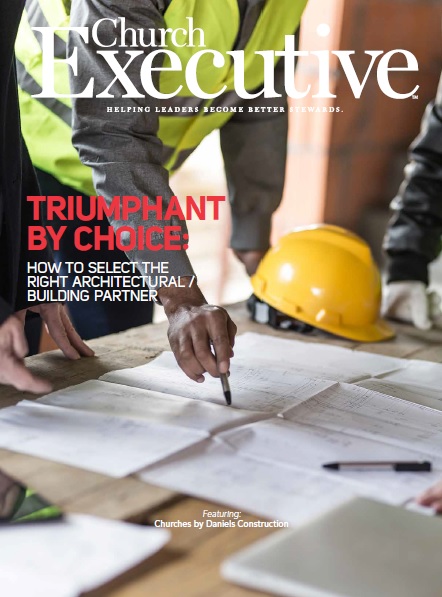
For many pastors, a large-scale building project is something they only do once or twice in their careers. Despite all the unknowns, one thing is certain: the right architectural / building partner is absolutely critical.

President & CEO
Churches by Daniels Construction
In many churches, problems can arise from choosing an architect within the congregation. While the intention is a good one, what are some of the major pitfalls of this approach?
Charlie Daniels: The real question, to me, is choosing an architect who is experienced in designing churches. A church — a facility for ministry — is unique and unlike other commercial buildings. The goal is to have a functional product, correct? If you choose someone who’s unexperienced, you risk a result that won’t appropriately serve your church and community. Design goes beyond aesthetics.
When a church leader reaches out to your firm, what information and documentation is helpful for you to have on hand for helping vet the church’s needs?
Daniels: We start with a questionnaire that looks at all aspects of their building and ministry needs — from worship style to children and youth, special needs ministry, gathering / common areas, classrooms and educational space, to name a few.
Second, from a financial / cost perspective, we help a church understand what a realistic budget and timeline are for its project. This is important for fundraising and lending parameters.
We also want to help them understand a timeline. There’s often an impact on services based on what kind of project the church is undertaking. Where do they go if we’re renovating a sanctuary? If they’re in a temporary location, how long will they be displaced? What’s the financial impact and commitment of leasing a temporary space?
If a church leader is committed to ensuring the right architect fit for its project, what questions are critical to ask during the interview process?
Daniels: How many church projects has he / she been involved in? Were those projects finished at or under budget? Were timelines met? How are costs controlled and evaluated? Does the architect partner with a construction firm or offer design / build? What value engineering can be offered to help the project be as financially prudent as possible?
Ask for references from at least four or five churches they’ve completed.
“A big part of the design process is to understand and develop a master plan that will help the church understand its current and future needs.”
When selecting an architect, how important are references from other churches? And what kinds of questions should a church be asking?
Daniels: Think of it this way: when you’re looking for a new pediatrician or a new mechanic, you don’t go with the first person you find on Google; you ask friends and family, and you read online reviews.
With something on the scale of a church facility, this same level of precaution — at minimum — is warranted. Call peers you trust and whose opinions you value, and ask questions. How was this process for you overall? Did you feel as though the contractor helped to alleviate stress? Did they communicate? Was their process open-book regarding realistic budgets and timeline?

Take your time and do your due diligence to find the right partner.
How important is geographical desirability (read: an architect’s location) in the final decision?
Daniels: While location can be helpful, experience is more important. Designing a church for today’s modern worship requires an architect to be experienced in the ever-evolving trends in church design.
For example, the architect needs to fully understand not only how the church operates today, but its growth projections and operational challenges for the next five, 10 or 20 years. A big part of the design process is to understand and develop a master plan that will help the church understand its current and future needs.
Is it important that a church visits an architect’s finished facility / facilities before making its final decision? If so, what should the church leader be looking for?
Daniels: Yes! The best thing to do is have the church’s facility manager give you a tour. He or she will know what’s good and bad about the building in ways the pastor won’t.
What’s unique, for you, about working with church clients versus commercial clients?
Daniels: A church has an enteral impact! While we get some financial reward on our projects, the greatest reward is helping a church increase its ministry effectiveness and kingdom impact.
How important is it for a church to work with an architect who specializes in church design?
Daniels: It’s important for the church to do its homework and take its time when selecting a design team for its upcoming project. The right team will integrate with the church’s team — as well as with the construction team — to create a cohesive unit that will work together to give you the project to meet your needs today and tomorrow, and also to stay within your budget.
— Reporting by RaeAnn Slaybaugh


